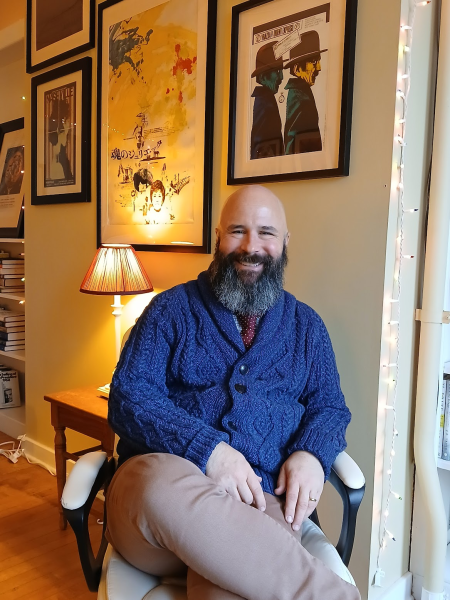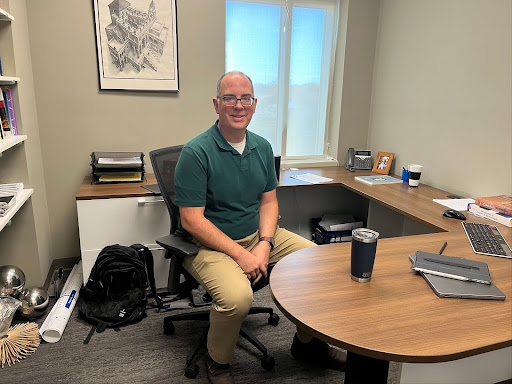Professor Spotlight: Dr. Josh Lord

Photo courtesy of Josh Lord
Josh Lord is an assistant professor in the Department of Biological Sciences at Moravian University. He earned his B.A. in biology at Colby College, his M.S. in marine biology at the University of Oregon, and his Ph.D. in oceanography at the University of Connecticut. This is his fifth year at Moravian.
What inspired you to go into your field of study?
I took a marine ecology class my junior year of college (the only ocean-related class that my college offered) and really enjoyed learning about all these amazing animals that I didn’t even know existed! It had never occurred to me that this was a potential career, and that sense of amazement carried me all the way through graduate school.
What research are you currently working on?
Two main projects, one focused on how more acidic ocean water impedes the ability of marine snails to find food, and one examining the social structure of coastal shrimp. The shrimp project is especially interesting, because we discovered that these shrimp have a social hierarchy, the only North American shrimp species known to exhibit this behavior. Since my student and I only recently discovered this behavior, nobody knows anything about it, so it has been fun to explore a topic that is truly unknown.
What do you think is the most recent important development in your field of study?
It isn’t a single development, but scientists are continually discovering how interconnected everything in the world is, especially in the ocean. We tend to think of fields like biology, chemistry, physics, psychology, politics, and sociology as disconnected silos, but the more we study any environmental issue, the more we realize that its tentacles touch every other field. For example, plastic pollution happens for a combination of economic, legal, political, psychological, and sociological reasons, but it has myriad impacts on ocean chemistry and even the behavior of marine animals. I think it is easier for people to ignore these connections in the hope that science will “find the solution” to many of our problems.
What job would you have if you couldn’t be a professor, regardless of salary and job outcome? Why?
I would love to be a nature guide or nature photographer because I could easily spend my time immersed in the wilderness somewhere! Or, in a very different vein, a sportswriter; that’s something I’ve had an irrational interest in since I was a kid, and there is something to be said about getting wrapped up in a world that is ultimately just games.
What do you know now that you wished you knew when you were in college?
That I wasn’t the only person who had no idea what I was doing there. It always seemed like everyone else knew what they were doing with their lives or that they had things figured out.
What is your biggest student pet peeve?
This might sound silly, but so many students here really sell themselves short or underestimate their own ability. Whether it is not thinking you’d do well in a “hard” class or skipping out on opportunities on or off campus that sound too intimidating, many of you could do more (and could do amazing things!) if you pushed yourself. So, I’m always trying to push students to try new things, follow their interests, go out of their comfort zone, and believe in their ability.
What was the last streaming show that you binge-watched or the last good book that you read?
I watched all of “Ted Lasso” in about a month, and we’re now watching a silly British YouTube show called “Taskmaster,” which is just a bunch of comedians competing at ridiculous tasks. It’s the perfect show to laugh and not have to think about!
What is something interesting about you that most people don’t know?
Professionally, I’ve been in a deep-sea submarine on the bottom of the ocean. Personally, I play soccer every weekend. I’m really not that interesting!
What animal do you feel you identify with? Why?
Harbor seals always seem so curious and happy. I suppose that is more of an aspirational choice.
As a marine biologist, do you think sea leviathans still exist? If you do, how do you think they have been able to deal with climate change and human-caused issues involving the ocean? If you do not, how do you think something that can be so large be wiped out?
The coelacanth is a large prehistoric fish that we thought was extinct, until it was discovered alive a couple decades ago. Giant squid (krakens!) are real but had never been captured on video until about 10 years ago, and they can be 60 feet long! Plus, two US military submarines in the last 10 years (one in 2021) have crashed into underwater mountains that we didn’t even know existed. You would think that any massive marine animal would have been spotted by now, but with less than 5% of the bottom of the ocean explored, can we really rule anything out?










